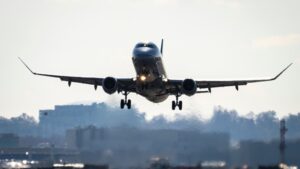United Airlines Adapts to Changing Travel Demands: What It Means for Investors
In breaking news from the aviation industry, United Airlines has shared some insightful perspectives at a recent Barclays industry conference. As travel demand continues to shift, the airline is adjusting its sails, especially in light of changes within governmental travel patterns.
A Shift in Government Travel
United Airlines’ Chief Financial Officer, Mike Leskinen, highlighted a downturn in travel demand from the U.S. government, which notably dropped post-inauguration of President Donald Trump. With the administration’s focus on reducing costs, the government travel segment—which typically contributes about 2% to United’s revenue—has seen a significant decline. This change is echoed in the rising jobless claims in Washington D.C., where many government workers have been laid off or offered buyouts.
In a world where airlines depend heavily on every revenue stream, this dip can sound alarm bells. Nonetheless, United appears to be finding its footing. The airline had nearly $52 billion in passenger revenue last year, signaling that despite the governmental shortfall, the remaining segments may be making up the gap.
A Silver Lining: International Leisure Travel
One of the standout points from Leskinen’s presentation is the resilience of international leisure travel demand. While domestic traffic has been less vigorous, international routes seem to be thriving, driven by pent-up travel desires and a growing global economy post-pandemic. Many travelers seem eager to explore international destinations, helping airlines like United to recover lost revenue from government travel.
At Extreme Investor Network, we see this as a crucial indicator for investors. The travel landscape is evolving and understanding these shifts helps in identifying potential opportunities. By focusing on international markets, United Airlines could pivot away from its reliance on domestic travel, which has fluctuated due to economic and political factors.
What This Means for Investors
For investors, it’s essential to monitor these industry trends and highlight the importance of company adaptability. United’s ability to enhance its international offerings while mitigating losses from government travel is a key strength.
Moreover, as costs are cut and operational efficiencies are prioritized, airlines may seek out more lucrative markets. Investors should look for airlines that adapt to changing travel behaviors and reduce reliance on low-margin revenue streams.
Moving Forward
In conclusion, while United Airlines grapples with a reduction in government travel demand, ongoing trends toward international leisure travel present new opportunities. Investors should keep a close eye on how airline strategies evolve in response to changing demands and the broader economic landscape.
At Extreme Investor Network, we strive to provide our community of investors with actionable insights and foresight in market trends. Stay tuned for more updates as we continue to track developments in the airline industry and other sectors. Together, let’s navigate the ever-changing world of business with clarity and precision.

